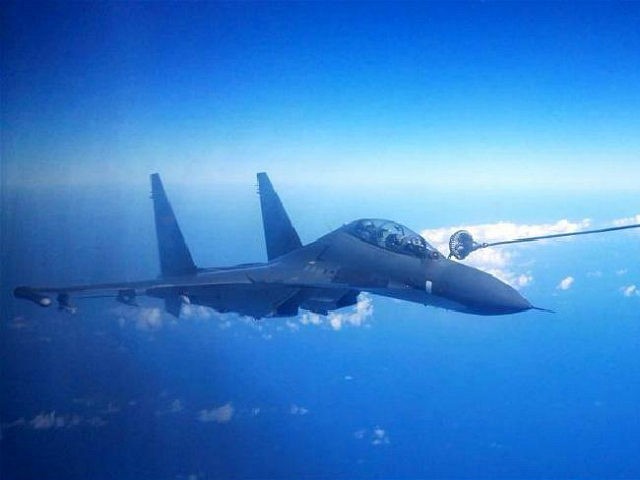Chinese People’s Liberation Army (PLA) warplanes violated Taiwan’s airspace for the second consecutive day on Thursday, according to the island nation’s defense ministry.
“[A] number of Sukhoi Su-30 fighters and Y-8 transport aircraft briefly entered Taiwan’s southwestern [air defense identification zone] ADIZ” early on Thursday, Taiwan’s Ministry of National Defense (MND) said in a press statement, according to Focus Taiwan. Taiwan’s Air Force closely monitored the PLA aircraft with “appropriate and effective measures,” until they exited the ADIZ, the MND said.
The PLA action on Thursday marked the second day in a row that Chinese fighter jets entered Taiwan’s southwestern airspace.
The MND said that multiple “Sukhoi Su-30 fighters and Chengdu J-10 fighters” briefly entered Taiwan’s ADIZ to its southwest on Wednesday morning. Taiwan’s Air Force “issued 24 verbal warnings over the radio for the Chinese aircraft to leave,” prompting the PLA warplanes to exit the ADIZ, Taiwan’s Liberty Times newspaper reported.
The PLA’s intrusion into Taiwanese airspace on Wednesday was “a destabilizing action which threatened regional peace,” Taiwan’s defense ministry said, according to Singapore news outlet CNA.
China’s violation of Taiwan’s airspace comes as the island’s military carries out live-fire weapons tests off its southeast and eastern coast this week.
Taiwanese President Tsai Ing-wen warned late last month that rising tension between China and Taiwan, and other nations bordering the South China Sea, has increased the potential for accidental military conflicts in the maritime region.
“There continue to be significant concerns over the potential for accidents, given increased military activity in the region. Therefore we believe it would be important for all parties to maintain open lines and communication to prevent misinterpretations or miscalculations,” Tsai said at an Australian Strategic Policy Institute forum.
“The risk of conflict requires careful management by all the parties concerned. We expect and hope that Beijing will continue to exercise restraint consistent with their obligations as a major regional power,” the president added.
Beijing considers Taiwan a renegade territory and has vowed to reunify the island with mainland China by force, if necessary. Taiwan operates as a sovereign state with its own government and military. In an effort to intimidate Taiwan and discourage its success as an independent state, China orders its military to regularly conduct aggressive exercises near the island’s sovereign airspace and waters, which it has done increasingly in recent months.

COMMENTS
Please let us know if you're having issues with commenting.